
Wilson Tong Wei-Shing Aka: “The Foot Doctor”.
With his tall build, high forehead, sharp features
and cold piercing eyes, Wilson Tong has the word “assassin” written all
over him. With his remarkable Peking Opera trained skills in acrobatics,
weapons displays and fancy footwork (which earned him the tag “The Foot
Doctor”), this is precisely the sort of role he almost exclusively played
during kung fu cinema’s golden age of the seventies for the films of Sammo
Hung, Lau Kar-leung and Lau Kar-wing. Later on he became a director in
his own right, making a handful of minor if quirky k-f comedies while continuing
to make near scene-stealing appearances in other movies.
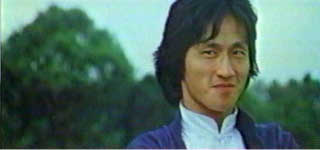 Wilson Tong was born in Mainland China. He got
to Hong-Kong at a young age in a way similar to Jet Li’s character in ROMEO
MUST DIE, using a float to help get into the colonial territory via the
sea. It is not known to me if he completed his Peking Opera training before
or after his arrival in H-K. Like with many Peking Opera trainees, Tong
became a stuntman/fighting extra for the then booming martial arts cinema
of the early seventies. His first recorded appearance was in BRUTAL BOXER
(72) a film also sporting a tiny glimpse of a young Jackie Chan as well
as his future stuntman buddy Mars.
Wilson Tong was born in Mainland China. He got
to Hong-Kong at a young age in a way similar to Jet Li’s character in ROMEO
MUST DIE, using a float to help get into the colonial territory via the
sea. It is not known to me if he completed his Peking Opera training before
or after his arrival in H-K. Like with many Peking Opera trainees, Tong
became a stuntman/fighting extra for the then booming martial arts cinema
of the early seventies. His first recorded appearance was in BRUTAL BOXER
(72) a film also sporting a tiny glimpse of a young Jackie Chan as well
as his future stuntman buddy Mars.
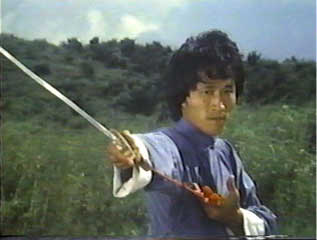 Shortly afterwards, Wilson Tong became a member
of Sammo Hung’s Golden Harvest stunt-crew, and in between 1973 and 1976
can be glimpsed in nearly a dozen productions - WHEN TAEKWANDO STRIKES,
ENTER THE DRAGON (both 73), THE SKYHAWK, THE TOURNAMENT, STONER, LAND OF
THE BRAVE (all 74), THE ASSOCIATION (75), HAND OF DEAD (sic.) (76). Through
those years, his most substantial part was in THE MANCHU BOXER (74), playing
a murderous Japanese henchman, where he got to show off his fighting ferocity
and acrobatic talent.
Shortly afterwards, Wilson Tong became a member
of Sammo Hung’s Golden Harvest stunt-crew, and in between 1973 and 1976
can be glimpsed in nearly a dozen productions - WHEN TAEKWANDO STRIKES,
ENTER THE DRAGON (both 73), THE SKYHAWK, THE TOURNAMENT, STONER, LAND OF
THE BRAVE (all 74), THE ASSOCIATION (75), HAND OF DEAD (sic.) (76). Through
those years, his most substantial part was in THE MANCHU BOXER (74), playing
a murderous Japanese henchman, where he got to show off his fighting ferocity
and acrobatic talent.
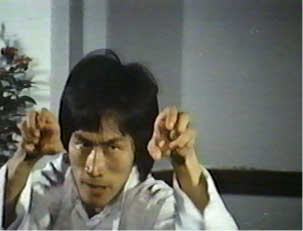 In 1976, Tong switched teams, going from Sammo’s
stunt crew to that of master filmmaker Lau Kar Leung. The previous year,
Lau had been the first action choreographer of modern martial arts cinema
to become a fully-fledged director. Now at the Shaw studio he was revolutionizing
the k-f sub-genre with movies featuring not only novel plot ideas and inspired
fight choreography but also by displaying a take of the martial arts essence
that was truer, more authentic and profound than had been previously found
in any other fighting film. Quite ironically though, shortly afterwards,
some of Lau’s own stunt-crew (including favourite heavies Fung Hark-Onn
and Lee Hoi-san) would switch over to Sammo’s own k-f revolution enacting
team. Tong’s first Lau film was CHALLENGE OF THE MASTER (76), than came
EXECUTIONER FROM SHAOLIN (77). In 1978, he graduated to being the
assistant action director for Lau’s seminal 36 CHAMBER OF SHAOLIN and worked
in that position too on the two other movies Lau made that year (SHAOLIN
MANTIS and HEROES OF THE EAST).
In 1976, Tong switched teams, going from Sammo’s
stunt crew to that of master filmmaker Lau Kar Leung. The previous year,
Lau had been the first action choreographer of modern martial arts cinema
to become a fully-fledged director. Now at the Shaw studio he was revolutionizing
the k-f sub-genre with movies featuring not only novel plot ideas and inspired
fight choreography but also by displaying a take of the martial arts essence
that was truer, more authentic and profound than had been previously found
in any other fighting film. Quite ironically though, shortly afterwards,
some of Lau’s own stunt-crew (including favourite heavies Fung Hark-Onn
and Lee Hoi-san) would switch over to Sammo’s own k-f revolution enacting
team. Tong’s first Lau film was CHALLENGE OF THE MASTER (76), than came
EXECUTIONER FROM SHAOLIN (77). In 1978, he graduated to being the
assistant action director for Lau’s seminal 36 CHAMBER OF SHAOLIN and worked
in that position too on the two other movies Lau made that year (SHAOLIN
MANTIS and HEROES OF THE EAST).
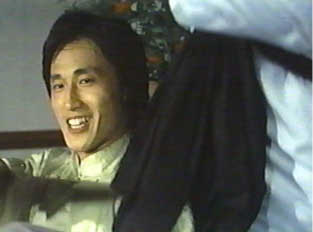 Tong also worked simultaneously for others; thus
he was involved in the directorial debut work of both martial art star
Chen Kwan Tai’s independently produced IRON MONKEY (77) as well as Lau
Kar-leung’s younger brother Lau Kar-wing’s HE HAS NOTHING BUT KUNG-FU (also
77). The next year, he played the main heavy in the younger Lau’s second
movie DIRTY KUNG-FU (78). This role furnished him with the opportunity
to perform some superb classic swordplay as well as acrobatics and “spiritual”
k-f. His other outstanding showcase of this period was SHAOLIN MANTIS.
In this movie, he wielded a kwan-do or Chinese halberd, using it with great
virtuosity often against two or even three enemies at a time.
Tong also worked simultaneously for others; thus
he was involved in the directorial debut work of both martial art star
Chen Kwan Tai’s independently produced IRON MONKEY (77) as well as Lau
Kar-leung’s younger brother Lau Kar-wing’s HE HAS NOTHING BUT KUNG-FU (also
77). The next year, he played the main heavy in the younger Lau’s second
movie DIRTY KUNG-FU (78). This role furnished him with the opportunity
to perform some superb classic swordplay as well as acrobatics and “spiritual”
k-f. His other outstanding showcase of this period was SHAOLIN MANTIS.
In this movie, he wielded a kwan-do or Chinese halberd, using it with great
virtuosity often against two or even three enemies at a time.
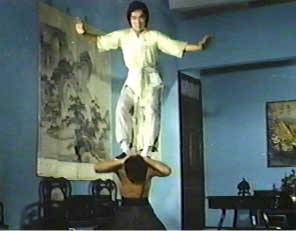 1978 also saw Tong going along with fellow stunt-mate
John Chang (not to be confused with Shaw Brothers star David/John Chiang)
to work for an independent film company named Goldlit which would give
them some major career opportunities. Indeed, their first film for this
production company, DUEL OF THE BRAVE ONES, was a starring vehicle for
the pair as well as the first feature film choreographed by Tong on his
own. The next year saw two more films where Chang was the lead, both choreographed
by Tong and directed by a fellow named Cheung Sam, TWO WONDEROUS TIGERS
and SNAKE IN THE MONKEY’S SHADOW. The latter - a knockoff of Jackie Chan’s
highly successful SNAKE IN THE EAGLE’S SHADOW - was also co-scripted
by Tong, his first piece of writing. Next, Tong graduated to being a full-fledged
director with KUNG-FU GENIUS (79). In doing so, he was following
in the footsteps of the Lau brothers, Sammo Hung, Yuen Woo Ping and Jackie
Chan as an action choreographer turned auteur. Tong though did not give
himself the lead role, remaining content to play his usual assassin role.
Still, this not prevent him however from choreographing a standout showcase
for himself that involved his villainous character fighting the film’s
hero using only a paper fan against a variety of weapons.
1978 also saw Tong going along with fellow stunt-mate
John Chang (not to be confused with Shaw Brothers star David/John Chiang)
to work for an independent film company named Goldlit which would give
them some major career opportunities. Indeed, their first film for this
production company, DUEL OF THE BRAVE ONES, was a starring vehicle for
the pair as well as the first feature film choreographed by Tong on his
own. The next year saw two more films where Chang was the lead, both choreographed
by Tong and directed by a fellow named Cheung Sam, TWO WONDEROUS TIGERS
and SNAKE IN THE MONKEY’S SHADOW. The latter - a knockoff of Jackie Chan’s
highly successful SNAKE IN THE EAGLE’S SHADOW - was also co-scripted
by Tong, his first piece of writing. Next, Tong graduated to being a full-fledged
director with KUNG-FU GENIUS (79). In doing so, he was following
in the footsteps of the Lau brothers, Sammo Hung, Yuen Woo Ping and Jackie
Chan as an action choreographer turned auteur. Tong though did not give
himself the lead role, remaining content to play his usual assassin role.
Still, this not prevent him however from choreographing a standout showcase
for himself that involved his villainous character fighting the film’s
hero using only a paper fan against a variety of weapons.
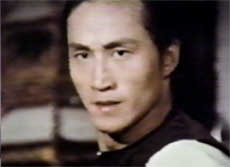 The end of 1979 and the beginning of 1980 saw
Tong directing and releasing three k-f comedies in quick succession - SNAKE
DEADLY ACT, DAGGER 8 and YOUNG AVENGER, the two first released within a
week of each other. These were rather slight efforts overall but both feature
intricate and colourful choreography as well as off-beat takes on some
established formulae of the genre. E.g., in SNAKE, the young hero’s master
(played by Fung hark-onn is quite obviously an evil man who wants to dupe
him into committing a frightful crime. In DAGGER 8, the young hero has
a string of masters (including a woman) who are all killed one after the
other. And in YOUNG AVENGER the young hero (Wong Yu) is asked by a ghost
to avenge him. None of these films appear to have been highly successful,
DAGGER 8 was taken out of theatres within days of being first released.
Tong’s short-lived association with Goldlit ended sometime in the mid-1980s
but it appears to have given him a taste for directing.
The end of 1979 and the beginning of 1980 saw
Tong directing and releasing three k-f comedies in quick succession - SNAKE
DEADLY ACT, DAGGER 8 and YOUNG AVENGER, the two first released within a
week of each other. These were rather slight efforts overall but both feature
intricate and colourful choreography as well as off-beat takes on some
established formulae of the genre. E.g., in SNAKE, the young hero’s master
(played by Fung hark-onn is quite obviously an evil man who wants to dupe
him into committing a frightful crime. In DAGGER 8, the young hero has
a string of masters (including a woman) who are all killed one after the
other. And in YOUNG AVENGER the young hero (Wong Yu) is asked by a ghost
to avenge him. None of these films appear to have been highly successful,
DAGGER 8 was taken out of theatres within days of being first released.
Tong’s short-lived association with Goldlit ended sometime in the mid-1980s
but it appears to have given him a taste for directing.
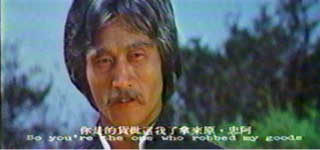 During his Goldlit ventures as well as afterwards,
Tong continued to appear in other movies such as IRON FISTS and BIG RASCAL
(both 79). For Lau Kar-leung’s DIRTY HO he played an assassin masquerading
as an antique dealer equipped with razor-tip shoes who engaged in a deceptive
jig of death with Gordon Liu. He did a one-shot comeback for his old-boss
Sammo Hung playing a fleet footed assassin in THE VICTIM. It was for doing
a complicated leg form in this movie that he earned the title of “The Foot-Doctor”
that was given by Sammo himself. 1981 saw him play two nearly
opposite type of roles for Lau Kar Leung. I.e., in MY YOUNG AUNTIE he plays
a sword wielding body guard who just keeps fighting the film heroes while
in MARTIAL CLUB he is a benevolent master art teacher who has no fight
scenes. That year, Tong also paid back an old favour by appearing in GOLD
HUNTER the directorial debut of his old comrade Fung Hark-onn. Finally,
1982 saw him do another fighting bit in Lau Kar-wing’s TREASURE HUNTER.
For a change, it was his turn to find himself at the other end of an assassin’s
weapon - with the person on the “right” end of it coming in the unlikely
form of a machete wielding pigtailed young girl: wu-shu stunt-woman Yeung
Chin Chin.
During his Goldlit ventures as well as afterwards,
Tong continued to appear in other movies such as IRON FISTS and BIG RASCAL
(both 79). For Lau Kar-leung’s DIRTY HO he played an assassin masquerading
as an antique dealer equipped with razor-tip shoes who engaged in a deceptive
jig of death with Gordon Liu. He did a one-shot comeback for his old-boss
Sammo Hung playing a fleet footed assassin in THE VICTIM. It was for doing
a complicated leg form in this movie that he earned the title of “The Foot-Doctor”
that was given by Sammo himself. 1981 saw him play two nearly
opposite type of roles for Lau Kar Leung. I.e., in MY YOUNG AUNTIE he plays
a sword wielding body guard who just keeps fighting the film heroes while
in MARTIAL CLUB he is a benevolent master art teacher who has no fight
scenes. That year, Tong also paid back an old favour by appearing in GOLD
HUNTER the directorial debut of his old comrade Fung Hark-onn. Finally,
1982 saw him do another fighting bit in Lau Kar-wing’s TREASURE HUNTER.
For a change, it was his turn to find himself at the other end of an assassin’s
weapon - with the person on the “right” end of it coming in the unlikely
form of a machete wielding pigtailed young girl: wu-shu stunt-woman Yeung
Chin Chin.
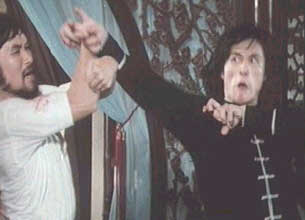 In 1982, Tong made a return behind the camera.
By that time, the old school martial arts genre was dying, so Tong made
a supernatural comedy instead entitled GHOST NURSING. Actually, from this
point on, the supernatural comedy thriller would be his genre of choice
and others that followed over the years were INVITATION OF GHOST (84),
GHOST BALLROOM (89), MUSICAL VAMPIRE (90), GHOSTLY BUS (95), Occasionally
though, he strayed with TWO JOLLY COPS (85) and THE SNIPING (90). Both
GHOST BALLROOM and MUSICAL VAMPIRE were his own productions as was the
wire-fu period extravaganza ALL MEN ARE BROTHERS (93).
In 1982, Tong made a return behind the camera.
By that time, the old school martial arts genre was dying, so Tong made
a supernatural comedy instead entitled GHOST NURSING. Actually, from this
point on, the supernatural comedy thriller would be his genre of choice
and others that followed over the years were INVITATION OF GHOST (84),
GHOST BALLROOM (89), MUSICAL VAMPIRE (90), GHOSTLY BUS (95), Occasionally
though, he strayed with TWO JOLLY COPS (85) and THE SNIPING (90). Both
GHOST BALLROOM and MUSICAL VAMPIRE were his own productions as was the
wire-fu period extravaganza ALL MEN ARE BROTHERS (93).
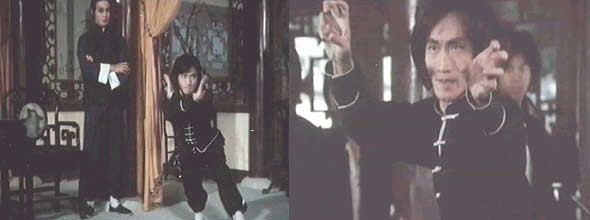 His return behind the camera saw him disappear
in front of it. Indeed, besides two of his own films, INVITATION OF GHOST
and GHOST BALLROOM, he has been seen only in his mentor Lau Kar-leung’s
action comedy TIGER ON A BEAT II, playing -- oh big surprise -- an assassin.
His return behind the camera saw him disappear
in front of it. Indeed, besides two of his own films, INVITATION OF GHOST
and GHOST BALLROOM, he has been seen only in his mentor Lau Kar-leung’s
action comedy TIGER ON A BEAT II, playing -- oh big surprise -- an assassin.
It is unclear what Wilson Tong was doing in
between his at times extended leaves of cinematic absence between films.
Most likely TV work. Despite the decline of H-K cinema in the nineties,
however he continued to make movies on a regular basis: most of them low
budgeted thrillers: DANGEROUS DUTY (96), THE PROFESSIONALS (98), VAMPIRE
COMBAT (2001).
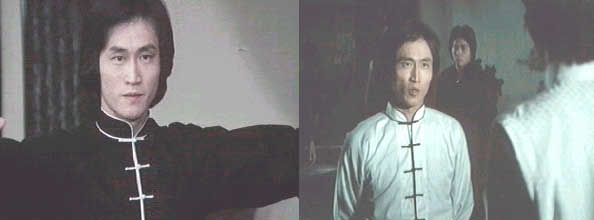 Although Wilson Tong has, for all intent and purposes,
not performed on the screen for two decades now, he still leaves behind
an outstanding legacy of physical virtuosity as anyone who has seen SHAOLIN
MANTIS, DIRTY KUNG-FU, DIRTY HO and THE VICTIM, among others, can testify.
Although Wilson Tong has, for all intent and purposes,
not performed on the screen for two decades now, he still leaves behind
an outstanding legacy of physical virtuosity as anyone who has seen SHAOLIN
MANTIS, DIRTY KUNG-FU, DIRTY HO and THE VICTIM, among others, can testify.
(Written by Yves Gendron)
Winnie Lau Siu-wai
Born 07/24/71 in Hong Kong
Winnie was primarily a popular singer in the
1990s. Her first album (In Your Dreams) was released in 1991 and more than
10 more albums were to follow over the next five years. In 1997 she announced
her retirement to the press, but I believe that she still performs occasionally.
 She dabbled in a few films as well – in fact she
began in film before launching her singing career – Path of Glory (1989),
Widow Warriors (1990 - Tien Niu’s character’s daughter),The Magic Touch
(Hui’s secretary), Twin Bracelets (1991), Gangs 92, Future Cops (1993 -
the snooty girl who falls for Jacky Cheung) and Legend of the Liquid Sword
(one of the three sisters).
She dabbled in a few films as well – in fact she
began in film before launching her singing career – Path of Glory (1989),
Widow Warriors (1990 - Tien Niu’s character’s daughter),The Magic Touch
(Hui’s secretary), Twin Bracelets (1991), Gangs 92, Future Cops (1993 -
the snooty girl who falls for Jacky Cheung) and Legend of the Liquid Sword
(one of the three sisters).

Winston Chao Wen-hsuan
Since his first big role in 1993 (The Wedding
Banquet), this dapper, sophisticated Taiwanese actor has seemingly opted
to appear in very few productions and almost always ones with a fine pedigree.
The Wedding Banquet was a surprise hit in the States and his role as the
gay lover who has to deal with his visiting parents from Taiwan brought
him a fair amount of publicity.
 He followed this with another film from director
Ang Lee – Eat Drink Man Woman – another international film that received
broad and positive recognition. In this film as the co-worker of Wu Chien-lien
his slightly distant and reserved characterization was often to be repeated
in other films.
He followed this with another film from director
Ang Lee – Eat Drink Man Woman – another international film that received
broad and positive recognition. In this film as the co-worker of Wu Chien-lien
his slightly distant and reserved characterization was often to be repeated
in other films.
 After these two films, Chao was to work with fellow
Taiwanese Sylvia Chang in three films -–The New Age of Living Together
(1994), I Want to Go on Living (1995) and Tonight Nobody Goes Home (1996).
Besides these Taiwanese connected films, he also has appeared in a few
Hong Kong films – Stanley Kwan’s Red Rose White Rose, The Soong Sisters
(as Sun Yat-sen), Intimates (Teresa Lee’s boyfriend), Destination 9th Heaven,
Thunder Cop (1996) and Island of Greed (1997). Additionally, he has
a cameo role as Michelle Yeoh’s character’s father in The Touch (2002).
After these two films, Chao was to work with fellow
Taiwanese Sylvia Chang in three films -–The New Age of Living Together
(1994), I Want to Go on Living (1995) and Tonight Nobody Goes Home (1996).
Besides these Taiwanese connected films, he also has appeared in a few
Hong Kong films – Stanley Kwan’s Red Rose White Rose, The Soong Sisters
(as Sun Yat-sen), Intimates (Teresa Lee’s boyfriend), Destination 9th Heaven,
Thunder Cop (1996) and Island of Greed (1997). Additionally, he has
a cameo role as Michelle Yeoh’s character’s father in The Touch (2002).

Wong Ching
This gap-toothed actor often played the comic
buffoon or the dastardly bad guy in a number of films in the 1970s and
1980s. During the old school kung fu era he appeared in films such as The
Heroic Ones, Chinese Boxer, King Boxer, Boxer from Shantung, Heroes Two
and Spiritual Kung fu.
 From the 1980s on, he shifted more towards a comic
persona with The Greatest Lover (the wealthy nitwit), Till Death Do We
Scare (the gangster), Happy Ghost 3 (the head gangster again), Lucky Stars
Go Places, Heartbeat 100 (the creepy peeper), The Thirty Million (Dollar)
Rush (the Inspector), Fractured Follies (Chow Yun Fat's brother).
From the 1980s on, he shifted more towards a comic
persona with The Greatest Lover (the wealthy nitwit), Till Death Do We
Scare (the gangster), Happy Ghost 3 (the head gangster again), Lucky Stars
Go Places, Heartbeat 100 (the creepy peeper), The Thirty Million (Dollar)
Rush (the Inspector), Fractured Follies (Chow Yun Fat's brother).
 He still played the occasional nasty non-comical
villain as well – one of the rapists in Her Vengeance who gets what he
deserves and as one of the Twin Villains in Handsome Siblings. He has no
credits in the HKMDB after 1992.
He still played the occasional nasty non-comical
villain as well – one of the rapists in Her Vengeance who gets what he
deserves and as one of the Twin Villains in Handsome Siblings. He has no
credits in the HKMDB after 1992.

Wong Chi-keung
This fellow showed up in the occasional film in the 80's almost always
as a creep. He has a small cameo in She Shoots Straight, is the main bad
guy in Midnight Whispers, Three Against the World (Boss Sung), Stars and
Roses (devil prison director), Rich and Famous (one of O Chun Hungs
gang), Its Now or Never and My Heart is that Eternal Rose

(Thanks to Michael Kistner for the information)
Wong Chi-yeung/ Karel Ng
Born on 08/10/67
Almost always a sleazy but good-looking bad
guy, Wong has been in numerous low budget action/triad films throughout
the 1990s and into the 2000s. A number of these were in the “Girls with
Guns” genre – Angel Terminator II (the main bad guy), Yes Madam ’92: A
Serious Shock (the bad guy who teams up with Moon Lee), The Real Me, New
Kids in Town (killer), Golden Nightmare, Raging Angels and X-Cop Girls
(again as the main bad guy).
 A few of his triad related films are Killers Love
(the hitman), Triads: the Inside Story (kills veteran actor Tien Feng),
Gangs 92, Young and Dangerous 5 and Story of a Prostitute. He is still
quite busy these days playing the bad guy and appeared in 8 films in 2000
and 4 films in 2001 including Fing’s Raver, Cop Shop Babes and Cop on a
Mission. A few other films that he has appeared in are Fight Back to School
(the cop/boyfriend of Cheung Man) and Off Track (a racer).
A few of his triad related films are Killers Love
(the hitman), Triads: the Inside Story (kills veteran actor Tien Feng),
Gangs 92, Young and Dangerous 5 and Story of a Prostitute. He is still
quite busy these days playing the bad guy and appeared in 8 films in 2000
and 4 films in 2001 including Fing’s Raver, Cop Shop Babes and Cop on a
Mission. A few other films that he has appeared in are Fight Back to School
(the cop/boyfriend of Cheung Man) and Off Track (a racer).
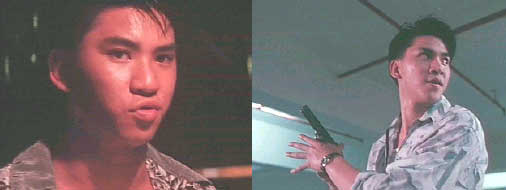 A few years ago the magazine Eastern Heroes had
an article on him and included this information: He grew up in Hong Kong
and initially considered a career in modeling but entered a "Search for
a Star" contest along with over 5,000 others - and came away with an acting
contract with TVB. His first TV series was Flying Tiger SWAT Team co-starring
with a young Donnie Yen. Even though he had no martial arts training, he
took well to being directed in action scenes and most of his films over
the years have been in the action/crime genre.
A few years ago the magazine Eastern Heroes had
an article on him and included this information: He grew up in Hong Kong
and initially considered a career in modeling but entered a "Search for
a Star" contest along with over 5,000 others - and came away with an acting
contract with TVB. His first TV series was Flying Tiger SWAT Team co-starring
with a young Donnie Yen. Even though he had no martial arts training, he
took well to being directed in action scenes and most of his films over
the years have been in the action/crime genre.
 Even with his early boyish good looks he was cast
as the villain right from the beginning in his film debut The Last Duel
in which he plays a corrupt cop. One of his most famous roles was as the
Manchurian commander in Once Upon a Time in China alongside Jet Li. Karel
says he doesn't mind being slotted as a bad guy and has even spent time
talking with criminals and gang members in order to make his performances
more realistic.
Even with his early boyish good looks he was cast
as the villain right from the beginning in his film debut The Last Duel
in which he plays a corrupt cop. One of his most famous roles was as the
Manchurian commander in Once Upon a Time in China alongside Jet Li. Karel
says he doesn't mind being slotted as a bad guy and has even spent time
talking with criminals and gang members in order to make his performances
more realistic.

Wong Ching Lam
This fellow plays a villain in a number of
Taiwanese low budget action and girls with guns films (Pink Panther).

Wong Hai/Hoi
He's part of Sammo's boys. He was also
in Encounter's of the Spooky Kind as the guy who was sleeping with Sammo's
wife. He's in the Deadly Challenger as the boss of a school, he's in Dirty
Tiger, Crazy Frog as one of the men in the beginning who tries to catch
Lau Kar Wing. He was Sammo's second challenge in The Victim.
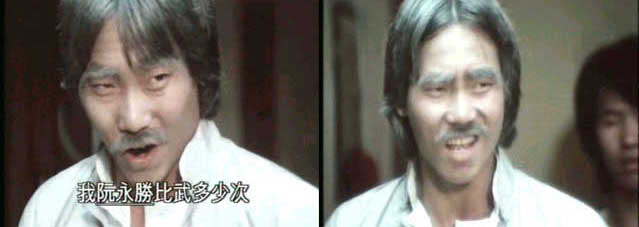
(Write up by The Silver Fox)
Wong Hei/Wong He
A very popular TV actor on TVB, Wong Hei has
appeared in only a few notable films to date – Passion 1995 (Christy Chung's
creepy boyfriend), The Accident (as the Mainland homosexual), Mad Stylist
and Undercover Blues (2000).
 He has also done work as a radio personality,
but got into trouble for using foul language on the air. Alternatively,
has made his many female fans happy by publishing a nude pictorial book
of himself.
He has also done work as a radio personality,
but got into trouble for using foul language on the air. Alternatively,
has made his many female fans happy by publishing a nude pictorial book
of himself.

A little more on Wong Hei from C.Y. Szeto:
Wong Hei gets into trouble a lot for his habit
of rewriting scripts (he claims it is so the dialogue goes smoother).
What is probably true is that he has intentions to get more involved behind
the scenes and maybe even become a director. He has directed an MTV
video and has co-written some scenes in his TV serials.
He has also been covering all the bases of
becoming a well-rounded entertainer. A former cop, he's been a DJ,
VJ, TV actor, movie actor, and most recently, pop singer and lyricist.
Can we say ambitious?
Wong Jing
Born in 1956 in HK
Though his films are often vilified and treated
with contempt by many people, it is difficult to even imagine the Hong
Kong film landscape of the 1980s and 1990s without the presence of Wong
Jing. In his roles of producer, writer and director, Wong was responsible
for a huge number of films that touched upon nearly every genre that existed.
Admittedly, he often followed trends set by other directors but he almost
always added his own trademark slick style and common touch that made them
his distinct product. An art film is anathema to Wong – he never attempted
to make a film that would travel the international film circuits but, instead,
made films for the working class HK audience. He succeeded admirably
for many years with an amazing sense of what would play well - and his
films often were among the biggest box office hits.
 Criticize him all you want for bringing down the
level of HK film – snigger for his output often being crude, stupid, nonsensical,
tasteless – but what would HK film be without the following:
Criticize him all you want for bringing down the
level of HK film – snigger for his output often being crude, stupid, nonsensical,
tasteless – but what would HK film be without the following:
Magnificent Butcher (writer)
Prodigal Son (writer)
The Seventh Curse (writer)
Evil Cat (writer)
The Fortune Code (writer)
My Neighbors are Phantoms (writer)
The Banquet (writer)
Flying Dagger (writer)
The Romancing Star (director/writer)
Casino Raiders (director/writer)
God of Gamblers/II/III/Returns (director/writer)
The Big Score (director/writer)
Royal Tramp I & II (director/writer)
Casino Tycoon I & II (director/writer)
Holy Weapon (director)
City Hunter (director/writer)
Raped by an Angel (director)
Kung Fu Cult Master (director/writer)
Boys are Easy (director/writer)
Last Hero in China (director/writer)
The New Legend of Shaolin (director/writer)
Hail the Judge (director/writer)
Whatever You Want (director/writer)
High Risk (director/writer)
Ghostly Vixen (producer/writer)
Queen of the Underworld (producer/writer)
Fight Back to School (producer)
Lee Rock I & II (producer)
Deadly Dream Woman (producer)
Naked Killer (producer)
She Starts Fires (producer/writer)
Millionaire Cop (producer)
To Live and Die in Tsimshatsui (producer)
My Father is a Hero (producer)
Lover of the Last Empress (producer)
Young Policemen in Love (producer)
I’m Your Birthday Cake (producer)
Forbidden City Cop (producer)
Sexy and Dangerous (producer)
Sex and Zen II (producer)
Ebola Syndrome (producer)
Her Name is Cat (producer/writer)
Cheap Killers (producer/writer)
No, they are not all classics but many of them
are certainly a lot of fun and that’s what Wong Jing primarily sets out
to do – to entertain for ninety minutes or thereabouts with his films –
and, of course, to make a lot of money! So he throws in anything he can
think of from sex with an infected corpse and a piece of meat (Ebola Syndrome)
to female killers in hotpants (Naked Killer) to a ghost that needs to perform
oral sex on 100 virgins and suck out their life force to reincarnate (Ghostly
Vixen). It isn’t art but it entertains.
 Along with the outrageous films with which he
is most associated, he certainly should get some credit for a number of
quality films as well – The God of Gambler series, the sublime Forbidden
City Cop with Stephen Chow (along with two other Chow films - Fight Back
to School and Hail the Judge), the Jet Li vehicles (My Father is a Hero,
Kung Fu Cult Master, The Legend of Shaolin and High Risk), Portland Street
Blues (credited as Presenter) and the wonderfully zany Boys are Easy.
Along with the outrageous films with which he
is most associated, he certainly should get some credit for a number of
quality films as well – The God of Gambler series, the sublime Forbidden
City Cop with Stephen Chow (along with two other Chow films - Fight Back
to School and Hail the Judge), the Jet Li vehicles (My Father is a Hero,
Kung Fu Cult Master, The Legend of Shaolin and High Risk), Portland Street
Blues (credited as Presenter) and the wonderfully zany Boys are Easy.
 He is the son of Wong Ting-lam a well-known producer/director
in film and TV from the 1950s through the 80s (and who has turned to acting
recently in films like The Mission and other Milkyway Image offerings).
While studying at Chinese University he began writing scripts for TV. He
asked his father for permission to study film in England, but his father
said "just observe and you will learn the craft" and that is what he proceeded
to do (thankfully, can you picture Wong Jing as a director of Masterpiece
Theater!). With some success there, he next began writing scripts for the
Shaw Brothers’ film arm – his first for a film called Cunning Tendency
in 1978, Mahjong Heroes in 1982 and Hong Kong Playboys in 1983. He also
wrote for Golden Harvest and helped produced the scripts for the two classic
Sammo Hung films – The Magnificent Butcher and The Prodigal Son. His first
duties as director were also for the Shaws – the 1981 Challenge of the
Gamesters.
He is the son of Wong Ting-lam a well-known producer/director
in film and TV from the 1950s through the 80s (and who has turned to acting
recently in films like The Mission and other Milkyway Image offerings).
While studying at Chinese University he began writing scripts for TV. He
asked his father for permission to study film in England, but his father
said "just observe and you will learn the craft" and that is what he proceeded
to do (thankfully, can you picture Wong Jing as a director of Masterpiece
Theater!). With some success there, he next began writing scripts for the
Shaw Brothers’ film arm – his first for a film called Cunning Tendency
in 1978, Mahjong Heroes in 1982 and Hong Kong Playboys in 1983. He also
wrote for Golden Harvest and helped produced the scripts for the two classic
Sammo Hung films – The Magnificent Butcher and The Prodigal Son. His first
duties as director were also for the Shaws – the 1981 Challenge of the
Gamesters.
 Over the next six years there was very little
that Wong Jing came up with that would foreshadow his rise as one of the
top movie makers in Hong Kong – director of Maggie Cheung in the cute Girl
with the Diamond Slipper and the writer of the cult film, The Seventh Curse.
It really wasn’t until the late 1980s – perhaps not coincidentally until
after connecting up with his muse, actress Chingmy Yau, that he began to
show his commercial genius. Casino Raiders with Andy Lau was a big hit
in 1989 and actually began the gambling film craze that Wong was to capitalize
on with the tremendously popular God of Gambler films. With these successes
under his ever expanding belt – he nearly became a one man industry – directing,
writing or producing 9 films in 1991, 9 films in 1992 and 12 films in 1993,
5 films in 1994, 12 films in 1995 and 11 films in 1996. Even with
the downturn in the HK film industry when so many have deserted the HK
film industry, Wong has continued to pump out product. Though in truth
his films seem to have lost that outrageous element and he seems to have
lost his instinct for what the audience wants to see. There are still a
few gems in his recent films though – Her Name is Cat (1998), Mr. Wai-Go
(1998), Erotic Nightmare (1999) and The Irresistible Piggies (2002).
Over the next six years there was very little
that Wong Jing came up with that would foreshadow his rise as one of the
top movie makers in Hong Kong – director of Maggie Cheung in the cute Girl
with the Diamond Slipper and the writer of the cult film, The Seventh Curse.
It really wasn’t until the late 1980s – perhaps not coincidentally until
after connecting up with his muse, actress Chingmy Yau, that he began to
show his commercial genius. Casino Raiders with Andy Lau was a big hit
in 1989 and actually began the gambling film craze that Wong was to capitalize
on with the tremendously popular God of Gambler films. With these successes
under his ever expanding belt – he nearly became a one man industry – directing,
writing or producing 9 films in 1991, 9 films in 1992 and 12 films in 1993,
5 films in 1994, 12 films in 1995 and 11 films in 1996. Even with
the downturn in the HK film industry when so many have deserted the HK
film industry, Wong has continued to pump out product. Though in truth
his films seem to have lost that outrageous element and he seems to have
lost his instinct for what the audience wants to see. There are still a
few gems in his recent films though – Her Name is Cat (1998), Mr. Wai-Go
(1998), Erotic Nightmare (1999) and The Irresistible Piggies (2002).
 Of course Wong Jing is in this section because
he has also acted in a number of films over the years – often just cameos
– but especially in the early years he had substantial roles in some of
his films – primarily of a comic nature. Some films in which he performed
are Girl with the Diamond Slipper (Slipper), The Ghost Snatchers (the main
character), How to Pick Up Girls (chases after Chingmy), Ghost Fever (married
to Pat Ha), Innocent Interloper (a student), The Romancing Star III (one
of the three guys), The Big Score, Cop Shop Babes (the insane doctor)
and many others. Lets just say though that it’s good that he didn’t have
to make his living through his acting skills!
Of course Wong Jing is in this section because
he has also acted in a number of films over the years – often just cameos
– but especially in the early years he had substantial roles in some of
his films – primarily of a comic nature. Some films in which he performed
are Girl with the Diamond Slipper (Slipper), The Ghost Snatchers (the main
character), How to Pick Up Girls (chases after Chingmy), Ghost Fever (married
to Pat Ha), Innocent Interloper (a student), The Romancing Star III (one
of the three guys), The Big Score, Cop Shop Babes (the insane doctor)
and many others. Lets just say though that it’s good that he didn’t have
to make his living through his acting skills!
 Of special importance to a few of us is his utilization
of the luscious Chingmy Yau in many of his films. He turned her from basically
a cute small time actress in romantic comedies – i.e. Crazy Companies,
How to Pick up Girls – in the late 80s to one of HK’s sexual icons in the
1990s with films like Naked Killer, Lover of the Last Empress, Raped by
an Angel and I’m Your Birthday Cake. Some of their other collaborations
were – Deadly Dream Woman, She Starts Fires, Casino Tycoon, Ghost Lantern,
Millionaire Cop, Legend of the Liquid Sword, High Risk, Blind Romance,
Royal Tramp I and II, City Hunter, Kung Fu Cult Master, Boys are Easy,
New Legend of Shaolin and Return to a Better Tomorrow. For this, many of
us are very grateful. By the late 90s the two had gone their separate ways
and Chingmy married someone else and retired in 2001. Wong is always on
the look out for his next big starlet – Kelly Lin/Lam being one of his
recent discoveries – but none have inspired him in the same way as did
Chingmy.
Of special importance to a few of us is his utilization
of the luscious Chingmy Yau in many of his films. He turned her from basically
a cute small time actress in romantic comedies – i.e. Crazy Companies,
How to Pick up Girls – in the late 80s to one of HK’s sexual icons in the
1990s with films like Naked Killer, Lover of the Last Empress, Raped by
an Angel and I’m Your Birthday Cake. Some of their other collaborations
were – Deadly Dream Woman, She Starts Fires, Casino Tycoon, Ghost Lantern,
Millionaire Cop, Legend of the Liquid Sword, High Risk, Blind Romance,
Royal Tramp I and II, City Hunter, Kung Fu Cult Master, Boys are Easy,
New Legend of Shaolin and Return to a Better Tomorrow. For this, many of
us are very grateful. By the late 90s the two had gone their separate ways
and Chingmy married someone else and retired in 2001. Wong is always on
the look out for his next big starlet – Kelly Lin/Lam being one of his
recent discoveries – but none have inspired him in the same way as did
Chingmy.
Wong Kam-kong
Wong Kam-kong has lent his wonderful authoritative
bad guy image to a few notable films – Gunmen (1988 – Adam Cheng’s main
man), Angel Hunter, Sam the Iron Bridge & One Arm Hero (the Governor),
Burning Paradise (Elder Kung), From Beijing with Love (Stephen Chow’s supervisor),
Wonder Seven (Colonel Yim).
 In the film Murder – Wong has one of his few good
guy roles as the investigating detective and an intriguing one in God of
Gamblers Returns.
In the film Murder – Wong has one of his few good
guy roles as the investigating detective and an intriguing one in God of
Gamblers Returns.

Wong San
He was one of those wonderful character actors
that popped up in bit parts in so many films that after a while you grow
a sense of affection for the fellow. His elderly gray haired genial fish
eyed persona usually formed his characters. He generally played a slightly
comical role in films like Seven Years Itch, It’s a Mad Mad Mad World II,
Crazy Companies II, Miracles (hotel reception), God of Gamblers, Spy Games,
Fight Back to School II (Cheung Man's father) and Happy Ghost V. He has
credits going back to the 1970s and can be spotted in Michael Hui's Games
Gamblers Play as the lecherous cardplayer with Betty Ting Pei.
 One of his best roles and a favorite of mine was
as Chow Yun Fat’s butler/major domo in The Fun, The Luck and the Tycoon.
As a cupid of love, he does what he can to get Chow and Sylvia Chang together.
A film I have not seen, A Chinese Torture Chamber Story II, has him credited
as the “heart-eating warrior” which sounds interesting! This role in 1998
was his last. Wong San died in 1999 at the age of 73.
One of his best roles and a favorite of mine was
as Chow Yun Fat’s butler/major domo in The Fun, The Luck and the Tycoon.
As a cupid of love, he does what he can to get Chow and Sylvia Chang together.
A film I have not seen, A Chinese Torture Chamber Story II, has him credited
as the “heart-eating warrior” which sounds interesting! This role in 1998
was his last. Wong San died in 1999 at the age of 73.

Wong Tao Aka: Don Wong/Don Wang /Wang Tao.
His name may not be well known in the West
outside of the Old-School field. Inside it though, Don Wong/Wang Tao is
widely acknowledge as one of the most appealing and reliable independent
players of Chinese martial-arts cinema. Handsome and charismatic, he was
an able actor whose range went from the intense brooder to the cocky fighter.
Trained in the hand/arm centred fighting arts of Mantis Fist and Southern
style’s Hung Gar, this had him typecast as a “puncher” but equally trained
in Taekwando he was a great kicker as well and consequently one terrific
screen-fighter. In all, from the mid-seventies to the mid-eighties, he
played in around three dozen martial arts productions -- a good deal of
them minor classics of the genre -- and was often paired with other renowned
independent players as John Liu, Tang Tao Liang, Chan Sing, Chang Yi, Chen
Kwan Chun, Chang Yi, Lo Lieh and Angela Mao (after her
Golden Harvest days).
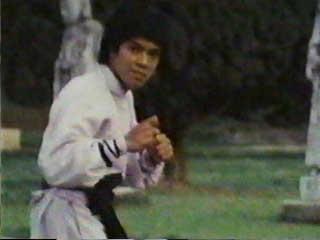 Don Wong appears to have been a discovery of Lo
Wei, the director who for a long time was credited with having “discovered”
the two k-f cinema greatest icons Bruce Lee and Jackie Chan (actually in
Bruce Lee’s case he only directed his first two movies for Golden Harvest
studio). In response to Bruce Lee’s huge success, the search was on for
another like him - a genuine martial artists with a potent screen-presence,
and with his strong square jaw, fierce piercing eyes and near feline like
allure. Wong not only fit the desired profile but bore a more than evocative
likeness to Bruce Lee, which naturally added to his appeal at least in
Lo Wei's eyes. How he discovered Wong and what Wong did before his movie
days is not known by this writer. It is said that he was originally a Californian
cop and this was in fact the role that he played in his very first screen
appearance: CHINATOWN CAPER (May 1974). His part was actually a very brief
one though, as he was on screen for less than five minutes before the ending
to kick ass. As it turned out, his late appearance was likely a prelude
for his first true starring vehicle that would be released a couple of
months later: THE YELLOW FACED TIGER (August 1974 -- also known as SLAUGHTER
IN SAN FRANCISCO). The film showed Wong with great screen-fighting skills
as well as a good screen presence and dramatic talent but he was impaired
by having to imitate Bruce Lee especially in the way he fought and he was
outshone by the cartoon villainy of the film’s main heavy: American hard-contact
champion Chuck Norris. It was a dreadful and inept film in nearly every
respect and a well-deserved dud at the box-office. Lo Wei reacted by immediately
dropping Wong, oblivious to the fact that it was the movie itself which
had dragged down his protégé’s great potential and not the
other way around. This left Wong out to dry with a film career dead in
the water before it even had the chance to start.
Don Wong appears to have been a discovery of Lo
Wei, the director who for a long time was credited with having “discovered”
the two k-f cinema greatest icons Bruce Lee and Jackie Chan (actually in
Bruce Lee’s case he only directed his first two movies for Golden Harvest
studio). In response to Bruce Lee’s huge success, the search was on for
another like him - a genuine martial artists with a potent screen-presence,
and with his strong square jaw, fierce piercing eyes and near feline like
allure. Wong not only fit the desired profile but bore a more than evocative
likeness to Bruce Lee, which naturally added to his appeal at least in
Lo Wei's eyes. How he discovered Wong and what Wong did before his movie
days is not known by this writer. It is said that he was originally a Californian
cop and this was in fact the role that he played in his very first screen
appearance: CHINATOWN CAPER (May 1974). His part was actually a very brief
one though, as he was on screen for less than five minutes before the ending
to kick ass. As it turned out, his late appearance was likely a prelude
for his first true starring vehicle that would be released a couple of
months later: THE YELLOW FACED TIGER (August 1974 -- also known as SLAUGHTER
IN SAN FRANCISCO). The film showed Wong with great screen-fighting skills
as well as a good screen presence and dramatic talent but he was impaired
by having to imitate Bruce Lee especially in the way he fought and he was
outshone by the cartoon villainy of the film’s main heavy: American hard-contact
champion Chuck Norris. It was a dreadful and inept film in nearly every
respect and a well-deserved dud at the box-office. Lo Wei reacted by immediately
dropping Wong, oblivious to the fact that it was the movie itself which
had dragged down his protégé’s great potential and not the
other way around. This left Wong out to dry with a film career dead in
the water before it even had the chance to start.
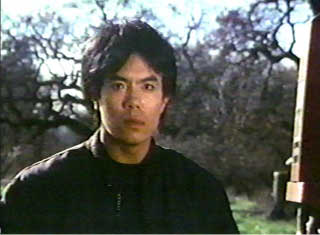
Some sources state that YELLOW FACED TIGER was
originally meant as a vehicle for Bruce Lee. The story goes that after
FIST OF FURY, Golden Harvest planned a third Bruce Lee film to be directed
again by Lo Wei but Bruce wanted nothing to do with the director despite
the huge success of those star-driven productions that had given Lo Wei
the title of “Millionaire Director”. Lo was in fact little more than a
hack who, while filming, concentrated more on the horse racing that was
broadcast on the radio than directing. Actually, the planned third film
was MAN CALLED TIGER with (Jimmy) Wang Yu acting as replacement, not YELLOW
FACED TIGER which was done nearly one year after Bruce Lee’s death. Interestingly
enough though, beyond their evocative likeness to one another and their
Scottish Surname, (Bruce and Don as in Donald) Wong and Bruce Lee did have
a surprising number of less superficial points in common e.g., both were
the sons of character actors, as Bruce Lee’s father was the famed Opera
performer Lee Hoi-chan while Wang Tao’s father was George Wang Jiu a bit
player in a couple of small Italian and American productions in the sixties
and seventies. Also both had a mixed-race background as Bruce Lee’s mother
was a half-German Eurasian and Wong’s father had some mix-Italian ancestry
(which may also account for Wong’s personal name of “Don”).
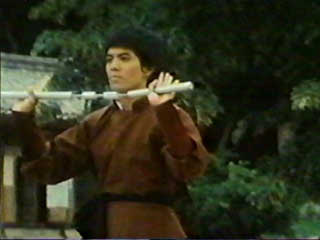
Had Don Wong’s career ended after the YELLOW FACE
TIGER debacle, his name would have more than likely ended-up in the dustbin
of history along the with the dozen of Bruce Lee wannabes who tried to
become k-f stars by imitating the Little Dragon. A couple of years went
by in Wong’s life that are not known to this author until he somehow crossed
the path of the canny and astute maverick independent filmmaker Ng See
Yuen. Ng saw potential in him beyond his Bruce Lee likeness, gave
him a second chance and cast him in his new movie SECRET RIVALS along with
two other promising martial art talents who also had false starts: super-kickers
John Liu and Hwang Jang Lee. Besides utilizing these new actors, the film
also rested on the ingenious gimmick of pairing a leg fighter with a Southern
style puncher (in that case Wong), and have the pair of them fight together
against a superior near invincible villain. The film turned out to be a
huge success finally putting Wong’s career on solid footing. If he may
have had Bruce Lee’s shadow hanging over him in YELLOW FACED, in RIVALS
he only momentarily evoked him with an impromptu display of nunchakus.
Otherwise, he totally dispelled the comparison to Lee with his distinct
southern fighting style and his own cocky charm. Don Wong was truly his
own man now. A couple of years later Ng See Yuen working as a producer
would once again salvage the career of another seemingly ill-fated Lo Wei
protege and make a star out of him: his name: Jackie Chan.
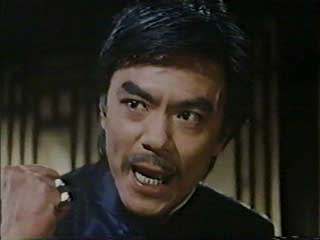 Shortly afterwards Don Wong starred in THE HOT
THE COOL AND THE VICIOUS, an easy but genial SECRET RIVALS knockoff, this
time co-starring none other than John Liu mentor’s Tang Tao Liang. The
film was produced by Wong’s own father, George Wang, who also played one
of the film’s heavies. This was the elder Wang’s first H-K film appearance.
The film was directed by Lee Tso Nam, probably one of the best independent
martial arts cinema directors from Taiwan who often put either some convoluted
intrigue or an enjoyable level of quirkiness into his films. The action
choreography and chief villainy was provided by trained Peking Opera performer
Gam Ming, also known as Tommy Lee. Both Lee and Gam would time and time
again encounter Wong through the years in several other k-f movie productions.
Shortly afterwards Don Wong starred in THE HOT
THE COOL AND THE VICIOUS, an easy but genial SECRET RIVALS knockoff, this
time co-starring none other than John Liu mentor’s Tang Tao Liang. The
film was produced by Wong’s own father, George Wang, who also played one
of the film’s heavies. This was the elder Wang’s first H-K film appearance.
The film was directed by Lee Tso Nam, probably one of the best independent
martial arts cinema directors from Taiwan who often put either some convoluted
intrigue or an enjoyable level of quirkiness into his films. The action
choreography and chief villainy was provided by trained Peking Opera performer
Gam Ming, also known as Tommy Lee. Both Lee and Gam would time and time
again encounter Wong through the years in several other k-f movie productions.
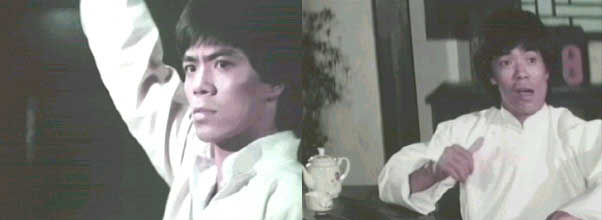 For the next eight years Don Wong made an average
of 4 or 5 movies a year, initially alternating between H-K and Taiwan before
focusing more on Taiwan. He rarely went into a solo-act and most of his
films saw him either co-starring with a heroic partner or as part of an
ensemble cast. This was the way martial arts cinema was largely operating
in this period. The day of the lone single hero was over. Having
Wong paired with a co-hero/co-star was the best way to capitalise on his
charisma and abilities and stimulate both the narrative and action within
the film.
For the next eight years Don Wong made an average
of 4 or 5 movies a year, initially alternating between H-K and Taiwan before
focusing more on Taiwan. He rarely went into a solo-act and most of his
films saw him either co-starring with a heroic partner or as part of an
ensemble cast. This was the way martial arts cinema was largely operating
in this period. The day of the lone single hero was over. Having
Wong paired with a co-hero/co-star was the best way to capitalise on his
charisma and abilities and stimulate both the narrative and action within
the film.
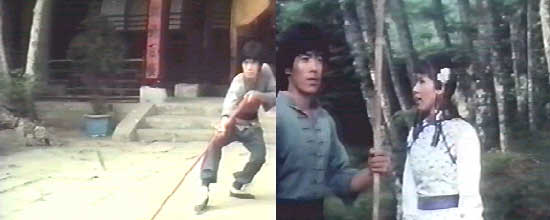 1976: STRUGGLE WITH DEATH (co-starring Phillip
Ko-Fei). 77: THE DAMNED,(also known as BANDITS
1976: STRUGGLE WITH DEATH (co-starring Phillip
Ko-Fei). 77: THE DAMNED,(also known as BANDITS
PROSITUTE AND SILVER) with Angela Mao and
Lo Lieh, TWO ASSASSINS (Chang Yi), ALONG CAME A TIGER (reputedly
one of his best, directed by Wu Ma), EAGLE CLAWS (directed by Lee Tso Lam,
co-starring Chen Kwan Chun), DUEL IN THE DESERT (with Angela), FIGHT FOR
SURVIVAL (co-starring k-f leading female stars Chia Ling and Polly Shang
Kwan Ling-feng) 78: SHAOLIN IRON CLAWS (Chang Yi, Chan Sing), SNAKY
KNIGHT FIGHT MANTIS (Chang Sing again, Carter Wong), SHAOLIN KUNG-FU MASTER
(Chang Yi), ASSAULT ON FINAL RIVAL. 79: SHAOLIN INVINCIBLE STICK
(co-starring the leggy Hsia),SHAOLIN DEVIL AND SHAOLIN ANGEL (Stephen Tung,
Chan Sing), TEN BROTHERS OF SHAOLIN (an ensemble cast movie co-starring
Chia Ling, Chan Sing, Chang Yi and Stephen Tung), MOONLIGHT SWORD AND JADE
LION (co-starring Angela Mao), DEATH DUAL OF KUNG-FU (John Liu, Phillip
Ko-Fei), PHANTOM KUNG-FU, (directed by Lee Tso Kam co-starring Chang Yi),
EUNUCH OF THE WESTERN PALACE. 80: THE PIONEERS (co starring King
Hu players Hsu Feng and Shi Ji), THE IRON SWALLOW, CHALLENGE OF DEATH (directed
by Lee Tso Lam, co-starring Tang Tao Liang and Chang Yi), FATAL NEEDLE
VS FATAL FISTS (Lee Tso Lam again co-starring Lo Lieh), 18 SWIRLING RIDERS
(Chia Ling, Chan Sing, Lo Lieh). 81: BATTLE FOR THE REPUPLIC OF CHINA
Wang Tao only Shaw Brother involve production, ADVENTURE FOR IMPERIAL
TRESURES. 82: REVENGE OF KUNG_FU MAO (with Angela Mao and Jimmy Wang
Yu ), WARLOCK OF THE BATTLEFIELD. 83: IMPOSSIBLE WOMAN, RIGHT
OVER-COME MIGHT (with Chan Sing).
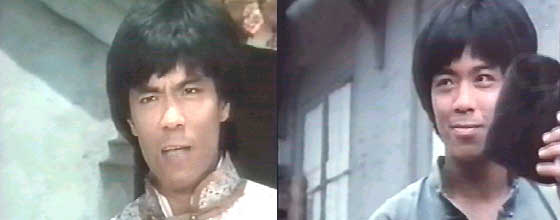 In time as martial arts cinema became more and
more an obsolete genre, Wong slipped into supporting roles and character
parts: DRUNKEN TAI-CHI (84), ISLAND WARRIOR WILD PANTHER (all 84), CRISIS
(85), THE STORY OF DOCTOR SUN YAT SUN (86).
In time as martial arts cinema became more and
more an obsolete genre, Wong slipped into supporting roles and character
parts: DRUNKEN TAI-CHI (84), ISLAND WARRIOR WILD PANTHER (all 84), CRISIS
(85), THE STORY OF DOCTOR SUN YAT SUN (86).
At some point, Wong left the H-K/Taiwan martial
arts scene altogether and moved to Thailand where he became a successful
TV soap opera star. He has not been seen in H-K since except for a small
part in the recent part VI of the Young and Dangerous series: BORN TO BE
KING (2000) where he could be seen playing alongside his father George
once more.
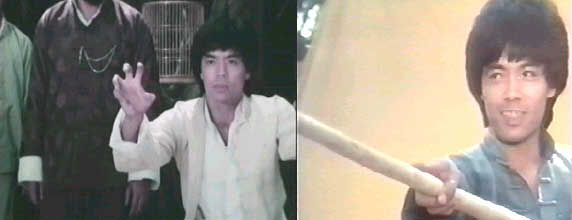 SECRET RIVALS, THE HOT THE COOL AND THE VICIOUS,
EAGLE CLAWS ALONG CAME THE TIGER, CHALLENGE OF DEATH, FATAL VS FATAL NEEDLE
and THE DAMN are reportedly the best Don Wong films.
SECRET RIVALS, THE HOT THE COOL AND THE VICIOUS,
EAGLE CLAWS ALONG CAME THE TIGER, CHALLENGE OF DEATH, FATAL VS FATAL NEEDLE
and THE DAMN are reportedly the best Don Wong films.
(Written by Yves Gendron with special input
by Linn Haynes)












































